Almost There: Tim Robbins in "The Player"
 Monday, July 5, 2021 at 9:55PM
Monday, July 5, 2021 at 9:55PM 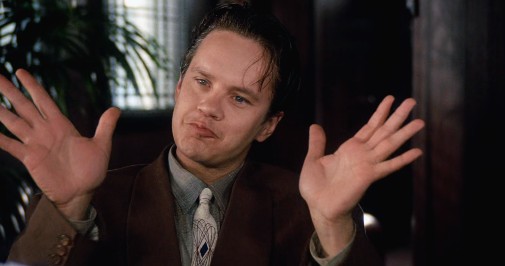
For the past few weeks, the Almost There series has been focused on performances that won at Cannes. Tomorrow, the latest edition of Europe's most prestigious film festival begins, so it's time to end our journey through the Croisette's past. After Woodward, Duvall, and Whitaker, it's time to take a look at Tim Robbins' work in Robert Altman's The Player. The flick marked its director's splashy comeback after a decade of minor works. Playing a venal big shot producer in a skewering of the movie business, Robbins won the Best Actor prize at Cannes, got terrific reviews, but failed to secure an Oscar nomination…
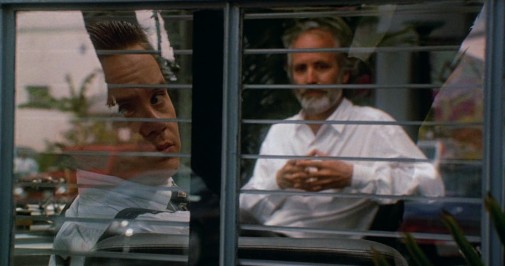
Adapted from a homonymous novel by Michael Tolkin, The Player tells the story of a Hollywood exec, Griffin Mill, who's been getting threatening missives from an unknown screenwriter. In the biosphere of the movie industry, as envisioned by this tale, writers and executives are mortal enemies, coexisting with the same acrimony as mongooses and snakes. This time around, however, one party trumps over the other, and, in a perfect satirical fashion, the killer gets away with murder. Under Robert Altman's direction, The Player becomes a star-studded mural of Tinsel Town degradation scored to the syncopated sound of Thomas Newman's most dissonant jazzy score. At the center of the insidious narrative, Tim Robbins plays Griffin Mill.
Altman's restless camera rarely stays on Robbins' face for long and tends to make him share the frame with fellow cast members. This deliberate lack of focus on the picture's leading man is especially apparent during its early passages, and it further informs how Robbins approaches the role. All indolent smiles and greasy insincerity, Mill's a man who doesn't let others perceive what's going on inside his head, hiding behind a mask of empty pleasantries. In the various wide shots during business lunches and industry parties, Robbins plays up the surface-level vacuity while peppering in little dissonant notes of distraction, anxiety, even fear.
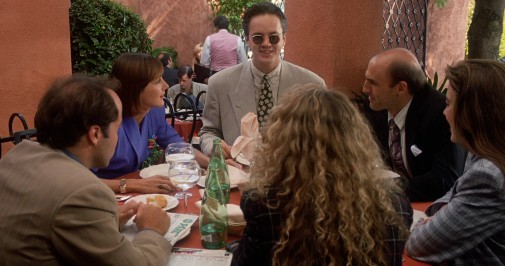
It's hard to concentrate on these aspects amidst all the visual and sonic information, but they're there. A switch at the end of the first act makes them more prominent. Mill's rendezvous with a mysterious writer is a spectacle of nervous flop sweat. The movie exec is out of his depth, and Robbins delineates the situation with the spoiled mirth of a sad clown. His eyes drift, not knowing where to stay, his mouth opens witlessly, like a fish out of water gasping for breath. This comedy of humiliation gradually sours into something more dangerous, animalistic, monstrous. Drunk with fury, Robbins' Mill explodes. It's sudden and short-lived for, the moment he realizes what happened, the frightened reality of the titular player is back.
Throughout the movie's emotionally fraught later acts, Robbins and Altman allow these dark sentiments to overwhelm both Mill and The Player. As the camera becomes more traditionally reverent to the leading actor, his mask cracks. The oily goo of paranoia spews forth, pungent and nasty, redefining Robbins' performance into a caricature of ill-will in a double-breasted suit. That is until the bliss of a Hollywood ending paints a varnish of peaceful evil over the whole affair. Still, even then, Robbins is excellent at allowing the light of joy to be shadowed by a villain's petty malevolence. He may be putatively out of danger, but the camera and the audience can sense the putridness of his being.
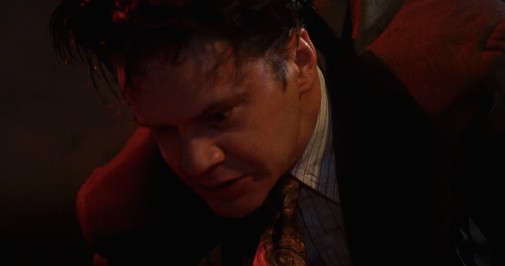
Watching him is like observing a corpse rot, skin stretched by astringent gases, flesh disintegrating in a pool of brown liquid. It's not like Griffin Mill's a good person at the start of The Player, but the constant pressure of fear, terror at the idea of persecution, worsens him. The macro arc of the performance is about decay - soul, spirit, mind, and business acumen simmering and reducing into a cadaverous mush. By the end, he's like a dead man walking, possessed by some unknown demon and smiling while he's at it. One almost expects to see him foaming at the mouth, though the actor never goes that far into kitsch.
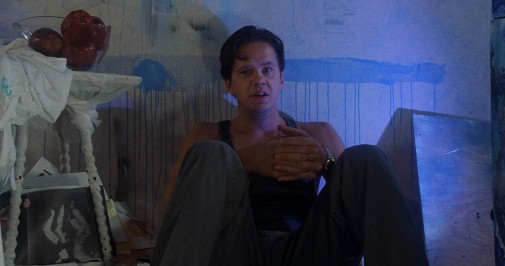
What most fascinates is how small Robbins allows the performance to be. It makes sense for Hollywood satire to eschew conventional movie archetypes and codified tropes. Consequently, Tim Robbins doesn't give Griffin Mill the star treatment, playing him more like a character actor than a protagonist. One almost gets the impression that he's a supporting character in someone else's story, a lateral note of sleaziness suddenly thrown into the eye of the storm that is a motion picture. He doesn't feel like he belongs there, fractious friction always manifesting between character and structure, actor and role. This dysfunction could be harmful, but it proves to be more of a feature than a bug in The Player.
Altman sure liked to explore such disconnections. Even during such elaborate set pieces as The Player's opening shot, his insistence on unpredictable improvisation makes sure that his cast's playing without a net. In Tim Robbins' case, the work is primarily one of reaction. Whether listening to ridiculous movie pitches or balking at Whoopi Goldberg's tampon-twirling intimidation, Robbins' discomfort is a product of character and genuine surprise at whatever Altman and company are throwing at him this time around. It's a remarkable high-wire act that the performer handles with aplomb. In fact, as one of movie history's great Hollywood douchebags, Robbins delivers a perfectly minor-key tour de force that's probably the best work of his career.
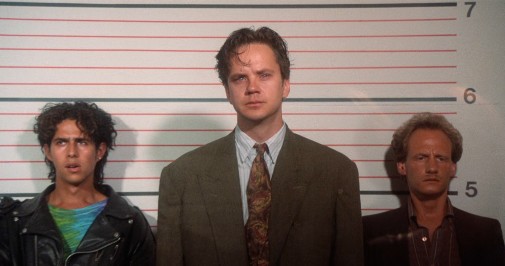
After his victory at Cannes, Tim Robbins went on to score Golden Globe and BAFTA nominations. Indeed, he won the HFPA prize for Best Actor in a Comedy or Musical. Nonetheless, AMPAS ignored him despite honoring The Player with three major nods for its directing, writing, and editing. That year, the Academy's Best Actor lineup was comprised of Robert Downey Jr. in Chaplin, Clint Eastwood in Unforgiven, Al Pacino in Scent of a Woman, Stephen Rea in The Crying Game, and Denzel Washington in Malcolm X. After many near-victories over the 70s, Pacino finally won the Oscar. Tim Robbins would get his own acting trophy a few years later when he won Best Supporting Actor for his work in Mystic River.
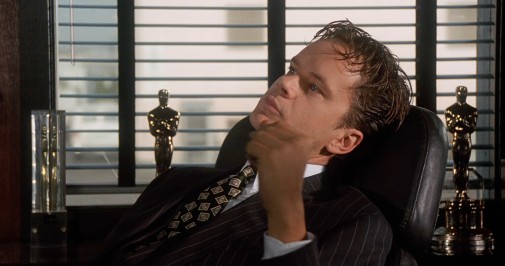
The Player is currently streaming on HBO Max and the Criterion Channel. You can also rent it on Amazon, Google Play, and Youtube.
 Almost There,
Almost There,  Best Actor,
Best Actor,  Cannes,
Cannes,  Oscars (90s),
Oscars (90s),  Robert Altman,
Robert Altman,  The Player,
The Player,  Tim Robbins
Tim Robbins 


Reader Comments (12)
I love this film and yes, Tim Robbins was robbed of an Oscar nomination. He was so great in that film as well as what happens to him in the end. The ending is genius.
This was the first Altman film I watched, and I loved it, Robbins is excellent, that year he gave another good performance in Bob Roberts.
Al Pacino was almost unbereable in Scent of a woman, Robbins, Oldman (Dracula) or Day-Lewis (The last of the mohicans) were way better.
Take out Clint and Pacino from that 1992 lineup for sure.
Tim Robbins is The Player, but Claudio us the motherfucking game!
Although he is very good in The Player I don't think he was robbed but I would have taken out Pacino at his OTT worst and Rea for Gary Oldman in Dracula and Jack Lemmon in Glenngary Glen Ross
Definitely replace Pacino with Robbins. And the Oscar goes to...Stephen Rea.
(But only after giving Pacino the Oscar for Dog Day Afternoon, and then a domino effect: Nicholson wins for The Last Detail, Lemmon for The Apartment, Lancaster for Atlantic City, Fonda for The Grapes of Wrath, Stewart for It's a Wonderful Life and March for A Star Is Born.)
Tim Robbins is one of those actors (like Renee) where, because he won an Oscar for a terrible performance, it's easy to forget that he can be fantastic.
I love the way he works with Altman, here and in Short Cuts. These manipulative boy-men roles are perfect for him.
I consider the ‘92 Best Actor lineup to be a fairly weak one, with Denzel being the only one I would have nominated myself. I’m not usually a fan of Tim Robbins, but this is easily the best performance of his career, and he would have made for a worthy nominee. My top pick that year would’ve been Harvey Keitel for Bad Lieutenant, but I get that the Academy was never going to embrace that film.
Tim Robbins was SO much better in The Player than he was in Mystic River.
I watched this years ago as a teenager and I liked the film and this role very much. Top moment? That sex scene/almost confession. That was hot, well done.
I'm another who preferred him in Bob Roberts. I also think the real snubs were the omissions of Jack Lemmon for Glengarry Glen Ross and Jack Nicholson for Hoffa
@TheDrMistery- That scene happened because of Greta Scacchi. Altman wanted to do a full nude/sex scene and Scacchi said she wasn't comfortable with that, so he changed the scene so they were only shot from the shoulders up in a close up shot.
At the time, a lot of people said that the film wouldn't be appreciated because "it was too close to home" The same thing was said about The Bad and the Beautiful which was also denied a Best Picture nomination. The Industry didn't really embrace The Player, not anywhere near to the extent that they did Scent of a Woman, Unforgiven, and Crying Game. Downey Jr, and Washington were giving undeniable performances and had to be nominated.